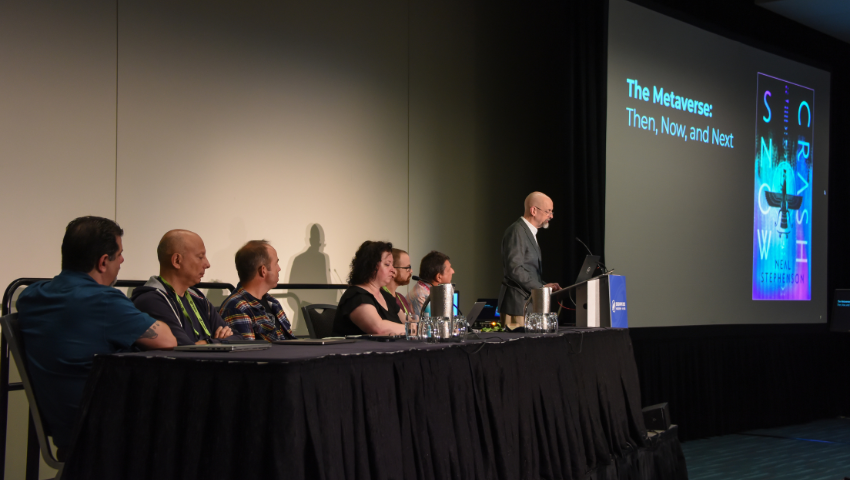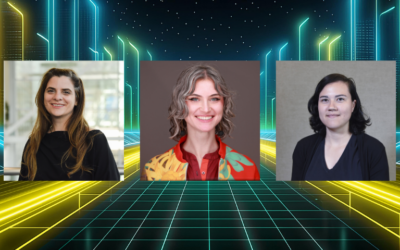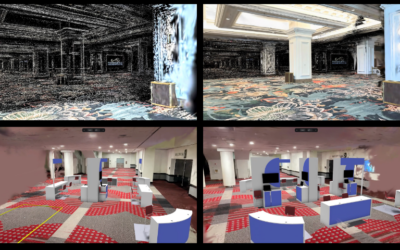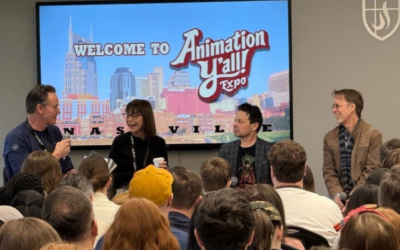photo by John Fujii © 2022 ACM SIGGRAPH
The SIGGRAPH Courses program is all about learning from the experts, and on Wednesday, 10 August, that’s exactly what we did! Patrick Cozzi (Cesium), Marc Petit (Epic Games), Morgan McGuire (Roblox), Jeff Petersen (Amazon Web Services), Nadine Alameh (OGC), and Neil Trevett (Khronos, NVIDIA) joined us for a no-hype introduction to the concepts and building blocks for the open metaverse. The SIGGRAPH 2022 Course Building the Open Metaverse: Part II covered the current state and potential future directions, including 3D-first computing, interoperability, game engine ecosystems, the evolution of content creation, scaling users and worlds, and interoperability.
Whether you are looking for a specific discussion or want to watch the full course, here’s a quick recap of each topic with its on-demand time stamp to make it easier than ever to get to where you want to be. Head over to the virtual conference platform and begin your metaverse learning journey today. Before you review this recap from Part II, be sure to check out Part I of the course on-demand.
Scaling the Roblox Real-time Distributed System for Global, Social 3D
00:04:23: Morgan McGuire kicks off Part II by sharing how Roblox incorporated the metaverse into its game and important factors to maximize players experience, including: 3D and Embodied, Simulated Fantastical, Cross-Device, Everyone Creates, and the most important: Meta-Experience State.
Scaling the Metaverse in the Cloud: Challenges of User-generated Content
57:20:00: Jeff Petersen steps up to the plate! Throughout his topic, he shared details about the huge content creation problem that surrounds the metaverse because people have an insatiable need for new content. It takes a lot of time and skill to create quality 3D content, and the types of content people are interested in is highly diverse and could be quite niche.
Blurring the Polyline: The Metaverse Is Geospatial
1:28:30: Next up: Nadine Alameh talks about why the metaverse is geospatial and why collaboration is essential. Using the Open Standards and FAIR (Findable, Accessible, Interoperable, Reusable), our global community of the experts in geospatial come together to try to solve the world’s biggest problems.
Why the Metaverse Will Be Built With Interoperability Standards and How We Can Make the Standards We Need
1:56:45: Neil Trevett closes out the metaverse presentations for the day. Split into three parts, he shares why interoperability standards are vital to building an open and inclusive metaverse. Using Khronos gITF as a case study on how to successfully build a standards ecosystem and the need for broader interoperability cooperation and the Metaverse Standards Forum.
Group Q&A
2:29:30: Throughout the presentation, did you have any questions you wish you were able to ask? They might have been already answered in the Group Q&A when they opened it up to the live audience.
Itching to watch this presentation but don’t have access to the virtual conference platform? You can still register to watch hours of SIGGRAPH 2022 on-demand content before 31 October.



